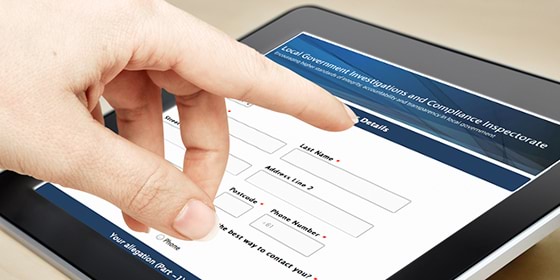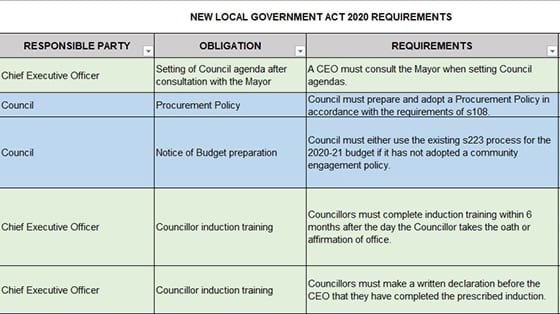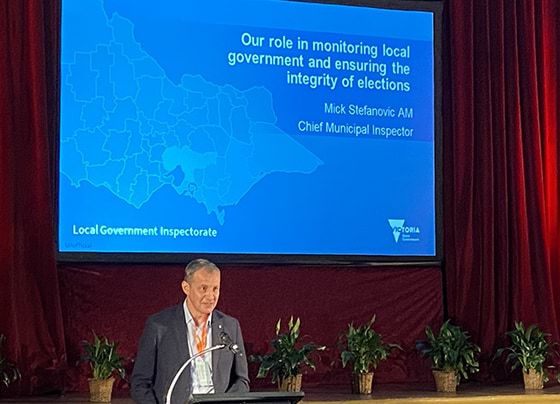- Date:
- 31 May 2021
This is my first opportunity, after a month in the role, to introduce myself to the readers of our integrity matters newsletter.
I would like to thank Acting Chief Municipal Inspector (CMI) Dr John Lynch for leading the organisation through a difficult year and to previous CMI David Wolf for his work in building the profile and direction of the LGI since its inception.
As I am keen to gain a better understanding of the local government sector, some Inspectorate staff and I will be taking part in online and in-person events and forums throughout the year. I welcome invitations to relevant events and council briefings.
From the contact I’ve had with councils and representatives from state government so far, there is a clear diversity, complexity and importance of the services that the 79 councils deliver to their local communities - this has reinforced to me that my job is not to get in your way but to aid you as councillors, council officers and members in the performance of your duties and to deliver the good governance our local communities deserve.
This latest edition of integrity matters discusses some of our work during the 2020 election period and our upcoming report on our findings and opportunities for improvement. We also detail how the Inspectorate receives and assess complaints, how to better manage council activities with a governance schedule.
I look forward to meeting many of you virtually or in person this year.
Mick Stefanovic AM
Chief Municipal Inspector
New Chief Municipal Inspector appointed
Introduction to our Chief Municipal Inspector.
Michael Stefanovic AM was appointed as the new Chief Municipal Inspector (CMI) and head of the Local Government Inspectorate in April.
Mr Stefanovic has 35 years of experience undertaking complex investigations in high-risk environments both within Australia and abroad. More information on his background is available on our website.
Mr Stefanovic took over from Acting CMI Dr John Lynch, who served in the role after the previous CMI David Wolf’s departure in January 2020.
Dr Lynch said: “I want to congratulate Michael on his appointment and I have every confidence he will build on the Inspectorate’s work of encouraging transparency and accountability across the sector.
“In my acting role, I was able to witness the important work done by the Inspectorate in holding councils to account and most recently, their ability to manage a large volume of complaints during the 2020 local council elections.”
Election complaints double in 2020
Our comprehensive report into the local government elections, to be published next month, will detail the numbers and trends of complaints we received during the 2020 elections.
During that period, we received 848 complaints which is a 107% increase on complaints in relation to the 2016 election period.
Over the 31 days of the election period, our staff were handling on average 36 complaints per day.
Social media has changed the election landscape across the world and was a significant feature in Victoria’s local government elections. In 2020, we received more than 350 complaints relating to online content.
On our online complaint form, we asked complainants to choose from a list of topics that best suited their complaint. We also categorised complaints received by email or phone in the topic areas shown here.
The first topic encompassed a wide range of issues that are commonly seen in elections and so we saw the greatest number of complaints fall into that topic area - related to alleged failures to comply with the election material authorisation provisions of the Act, which require the authoriser’s name and address to appear at the end of the material.

The intent of this requirement is to allow voters to access the source of the information and allow an opportunity to question the author or publisher of statements made in that campaign material.
Another allegation theme that emerged during the elections was complaints about misleading or deceptive matters.
Many complaints disputed the accuracy of statements made by other parties in material published either by themselves, or other candidates.
In most cases, complainants believe that any statement that is not totally accurate constitutes an offence. However, the courts have ruled (Evans v Crichton-Browne (1980)) that statements may be considered misleading and deceptive because they lead the voter to mark the ballot paper in a way, other than correctly, and not where untrue statements may contribute to the formation of an opinion about a candidate.
The full report will be published on our website in June.
How we assess complaints
The Local Government Inspectorate assesses and investigates complaints about Victorian councils that relate to breaches and offences against the Local Government Act 2020.

The majority of our work is to assess and potentially investigate conflicts of interest, the misuse of position by councillors, directing council staff and leaking of confidential information.
However, we receive many complaints we are not able to investigate. For example, we are not able to investigate complaints about rubbish disposal, rates, or disputes with neighbours about issue such as dog barking or fencing.
When we first receive a complaint, we conduct a preliminary assessment to determine if and how we are able to deal with it by a delegate of the Chief Municipal Inspector under Division4 of Part 7 of the Local Government Act 2020.
We can receive a complaint through an online form on our website, via email, post and telephone. We can also be referred complaints from another government body or agency or any of our staff can receive a complaint as part of their work.
We will accept a complaint, reject it or refer it to another agency. We will respond to the complainant within five business days to tell them what our decision is and why we made that decision. For more information on complaints we are unable to deal with, visit our complaints page.
Complaints that we accept are then assessed to determine the appropriate course of action. The complaint can be investigated, closed or reviewed to see if more work is needed to properly assess it.
A complaint can also be assessed as a public interest disclosure under the Public Interest Disclosures Act 2012.
We will always inform the complainant about the outcome of our assessment or seek authorisation if we want to refer a complaint to another agency. We work with other integrity and other agencies and we are able to refer complaints. We also get complaints referred to us to investigate.
Complaints about serious or systemic corruption are referred to the Independent Broad-based Anti-corruption Commission and complaints about an administrative action or decision of council are referred to the Victorian Ombudsman.
If appropriate, we also refer complaints to Victoria Police or the Victorian Human Rights and Equal Opportunities Commission.
Get your governance organised with a schedule
Like death and taxes, there are certain obligations councils can’t avoid. Annual reports must be published and budgets must be presented.

All Victorian councils must meet these regular statutory obligations and many of these obligations have deadlines – a legislated date the task must be completed by. Just think of all the new compliance requirements and deadlines required by the new Local Government Act 2020!
Many councils use calendars, often referred to as governance schedules, to ensure key deadlines are met. These calendars can be spreadsheets or software programs.
A governance schedule is a systematic way to help a council keep on top of their statutory obligations and ensure they meet the dates set out for these tasks. It also helps minimise the risk and reputational damage by non-compliance with statutory and audit requirements.
A good governance schedule will set out the task, when it needs to be done by and who is responsible for delivering it. It should able to be viewed by governance staff, the CEO with the corporate management team and Councillors and alert staff about what tasks are due and when they need to be completed.
Councils use a range of tools to record their governance schedules, from spreadsheets to organisation-wide calendars. But the effect is the same; a good governance schedule will enforce accountability, transparency and ensure compliance with the Local Government Act.
The schedule can include a range of obligations, including a register of interest returns, a register of delegations and a register of delegation to special committees.
Councils can also include the regular updating of council policies on their governance schedule. This will ensure the task is allocated and has a deadline attached to ensure policies are always current.
Regularly reviewing policies approximately every two years will ensure policies are compliance, realistic and relevant. A number of our recent investigations have found that some councils have failed to regularly review policies creating gaps in their governance arrangements.
A governance schedule is good management and good practice ensuring confidence and trust in council administration by councillors, the CEO, senior management and the community.
Find more information about governance schedules and examples of best practice.
Vale Malcolm Hole and Ray Brown
Wellington Shire and Cardinia Shire councils have paid tribute to Councillors Malcolm Hole and Ray Brown, who recently passed away.
Cr Hole’s foray into local politics began in 2000, when he stood for election to Wellington Shire. Cr Brown served as a councillor for Cardinia Shire since 2016.
Cr Hole was first elected in 2000 and was re-elected in 2003, 2006, 2009, 2012 and 2016.
He was mayor in 2002 and 2006. The former Wellington Shire mayor and deputy mayor was especially proud of his election to the board of the Municipal Association of Victoria and in particular the work he achieved while on the steering committee for the review of the Municipal Association Act 1907.
Knowing first-hand the importance of the timber industry to the livelihood of the Heyfield community, Cr Hole worked hard to defend and work towards the sustainability of the industry, not just in Heyfield but other timber communities throughout Victoria.
He was a founding member and served on the Timber Towns Victoria executive and was the president of the National Timber Councils Association for 10 years.
Cr Hole performed various roles on the Gippsland Local Government Network, Rural Councils Victoria and the Local Government Emergency Management Committee. He was a life member of Apex and a former district governor, dedicating 17 years' service to the community, and was involved with many boards and associations.
Cr Brown represented the Port Ward at Cardinia Shire from 2016 to 2000 alongside Councillor Graeme Moore, and represented Western Port Ward since October 2020.
Cr Brown lived in the region since 1970, and represented Council on a number of committees including the Audit Committee, Grants Evaluation Committee, Motorsports Clubs Steering Committee, Town Planning Committee, Westernport Catchment Implementation Committee, Western Port Biosphere Councillor Liaison Committee, and Yallock Drainage Advisory Committee to Melbourne Water.
Recently, he celebrated the opening of the Lang Lang Community Recreation Reserve and Pavilion, and oversaw the first roads commencing in Council’s Strategic Sealed Roads program at Koo Wee Rup as well as the commencement of works at Koo Wee Rup Recreation Reserve for a new netball pavilion and a new football and cricket pavilion.
*Thank you to Wellington and Cardinia Shire councils for contributing to this article.
Guidance and education program continues
Mick Stefanovic was invited to the Australian Local Government Women’s Association Victoria Conference (pictured above) on Saturday 1 May, making his first presentation in the CMI role on our elections work and role in maintaining the integrity and transparency of local government.

Mick joined Operations Manager Ross Millard to facilitate a local government session at an IBAC-hosted forum on public interest disclosures on 26 May. The pair will also facilitate a session at a IBAC Corruption Prevention & Integrity Insights Forum on 10 June.
Mick has also been invited to present at a Municipal Association of Victoria event on ‘Managing the CEO employment lifecycle - from a legal perspective’ on 3 June.
Inspectorate staff will be available to visit councils for presentations to CEOs, senior staff
and/or councillors. To arrange a visit, contact our business support officer at
inspectorate@lgi.vic.gov.au or on 7017 8212.
Virtual meeting measures extended
A mechanism to allow for virtual council meetings so that councils can continue to make decisions during the pandemic has been extended.
The measures have been extended to 26 April 2022 under the Justice Legislation Amendment (System Enhancements and Other Matters) Act 2021.
The extension will enable councils to continue to represent their communities and make critical decisions.
A Ministerial Good Practice Guideline has been published on the Local Government Victoria website to provide guidance to councils on using these mechanisms.
It sets out the requirements for virtual meetings, including access for the public and confidentiality.
More information about COVID Safe settings and what they mean for industries, individuals and travel is available on the Victorian Government's coronavirus website.
Local Government Victoria has information for councils with links to information about the various services councils provide, such as aged and disability services, immunisation services and sports and leisure facilities.
Find more details on LGV bulletins on the Local Government website.

